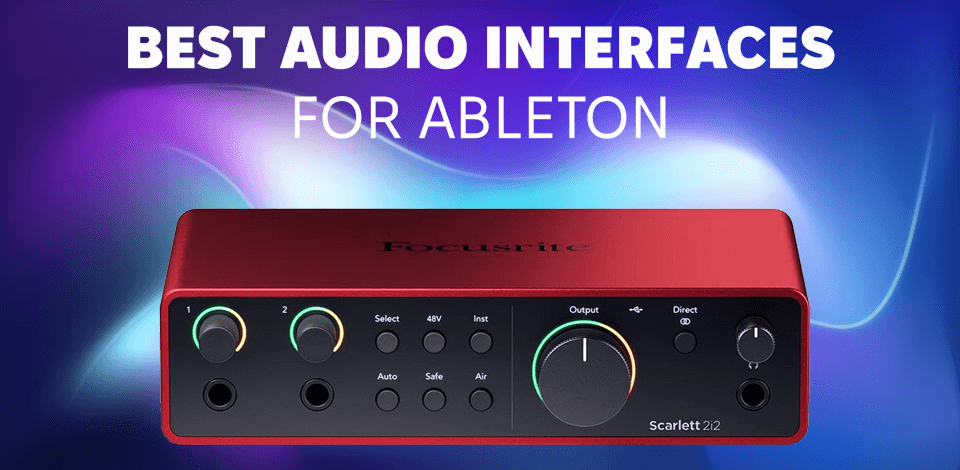
For every video editor who works with multimedia projects, the ability to record and edit hi-res audio is crucial. This is why I started my search for an audio interface for Ableton, offering top-notch performance, amazing sound quality, and low latency.
I was on the lookout for an interface suitable for different recording scenarios like capturing clean vocal tracks, high-quality instrument recordings, or managing my complex audio setups for my video projects.
 Focusrite Scarlett 2i2
Focusrite Scarlett 2i2
As for me, Focusrite Scarlett 2i2 is the best choice because of several reasons like seamless compatibility, high-quality sound with low latency, and user-friendly design. It boasts reliable performance with amazing preamps and great creativity options.
When selecting an audio interface for Ableton, I made sure that the chosen interface was fully compatible with the software to eliminate unpleasant integration issues. Another major aspect I paid attention to is sound quality, as clear and high-resolution recordings are of paramount importance to me.
Low latency was also essential for me, especially when it comes to real-time performance. I also looked for an interface with multiple connectivity options to satisfy all my recording needs, as well as models, which are user-friendly and can streamline my workflow.
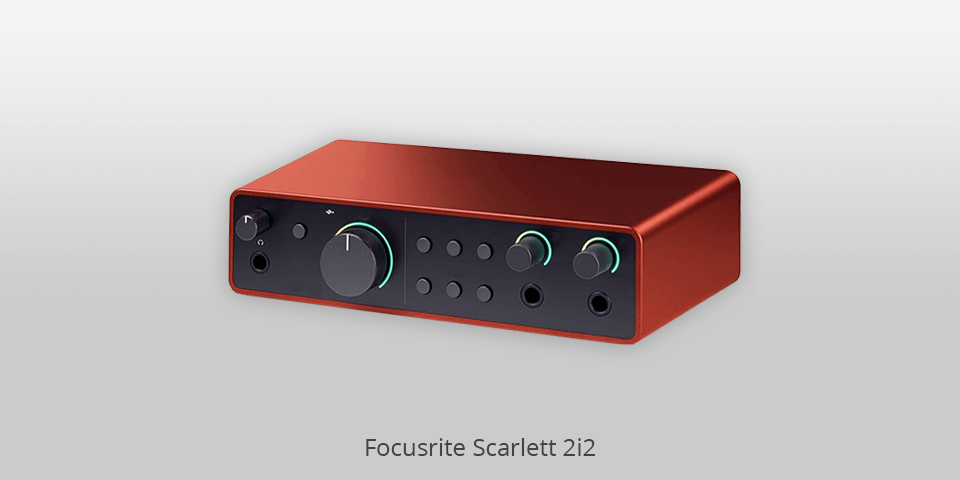
Connectivity: USB Type-C | Protocol: USB 2.0 | Resolution: 24-bit | Max Sample Rate: 192kHz | Number of Channels: 2
Focusrite Scarlett 2i2 4th Gen offers intuitive installation, as well as seamless integration with Ableton Live, which is my favorite DAW software. Another reason I chose this specific model is a 120dB dynamic range, which really makes the difference. The sound was clear and warm, no matter whether I was recording vocals, guitars, or even podcasts.
The improved preamps are top-level and this model is fitted with superior converters found in Focusrite's flagship interfaces. Thanks to these specs, the overall sound became noticeably better. The Air mode is another appealing feature for polishing vocals and guitars to get a professional sound.
The Auto Gain and Clip Safe functions are lifesavers when I’m in the zone and do not want to deal with levels or clipping. The Auto Gain defines the ideal level for my mic or guitar, and Clip Safe makes sure that my recordings are crisp and clear.
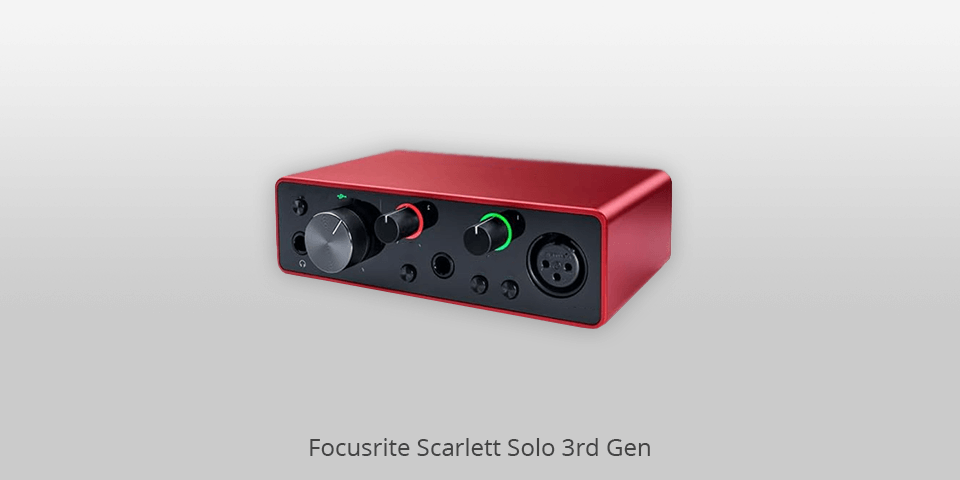
Connectivity: USB Type-C | Protocol: USB 2.0 | Resolution: 24-bit | Max Sample Rate: 192kHz | Number of Channels: 2
Thanks to the Easy Start tool, the setup process was a cinch. I only needed several minutes, and the audio interface was ready to work. Besides, the device offers a perfect integration with music-making app like Ableton. The Scarlett Solo has excellent preamps and top-level converters that make the recordings in Ableton professional and polished.
This model has a switchable Air mode, which is especially beneficial in cases when I’m recording acoustic instruments. This enhances the clarity and presence of vocals and guitars in your mix. High-headroom instrument input is another aspect I appreciate. It is important for me that my riffs do not have any unwanted clipping or distortion, and the Scarlett Solo copes with this task perfectly.
The low-noise balanced outputs are another positive aspect for me. This audio interface for Cubase delivers excellent playback quality, whether I’m managing my audio through studio monitors or listening to it via headphones. This feature comes in handy when I’m polishing the details of my mix in Ableton.
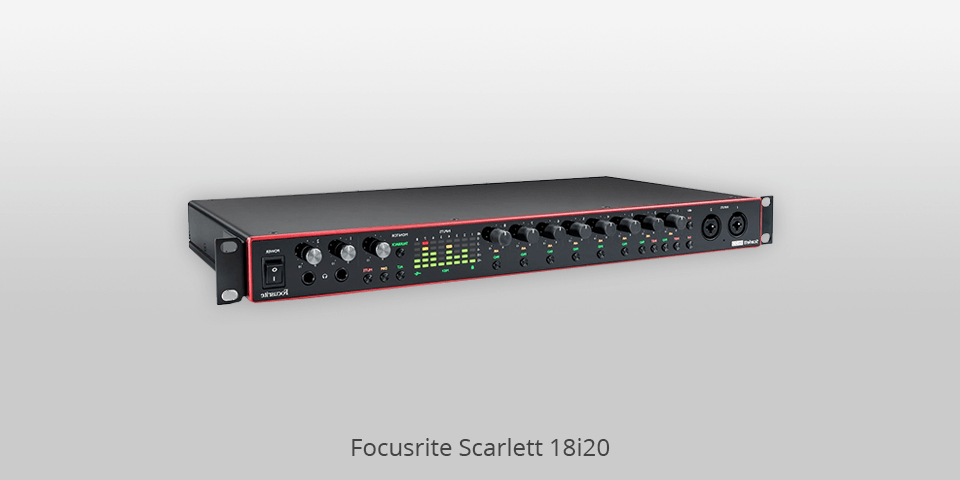
Connectivity: USB | Protocol: USB 2.0 | Resolution: 24-bit | Max Sample Rate: 192kHz | Number of Channels: 18
Scarlett 18i20 seamlessly integrates with Ableton. Working with Ableton Live without trouble, the interface delivers exceptional sound quality no matter whether I’m tracking several instruments or layering vocals. The 18i20 has low latency and offers clear monitoring to optimize the workflow.
This single rack unit provides 18 inputs and 20 outputs. It supports simultaneous recording of vocals, instruments, and MIDI signals, and offers ADAT optical inputs and WordClock synchronization. Its compact design makes it a great choice for any studio environment. The 18i20's ADAT input means that I can connect a second monitor to use for mixing.
The overall sound clarity and details have been improved greatly, resulting in more sophisticated and high-quality mixes. I also appreciate its dual headphone outputs and dual speaker outputs with independent controls for trouble-free switching between monitoring setups without the fear of damaging my speakers.
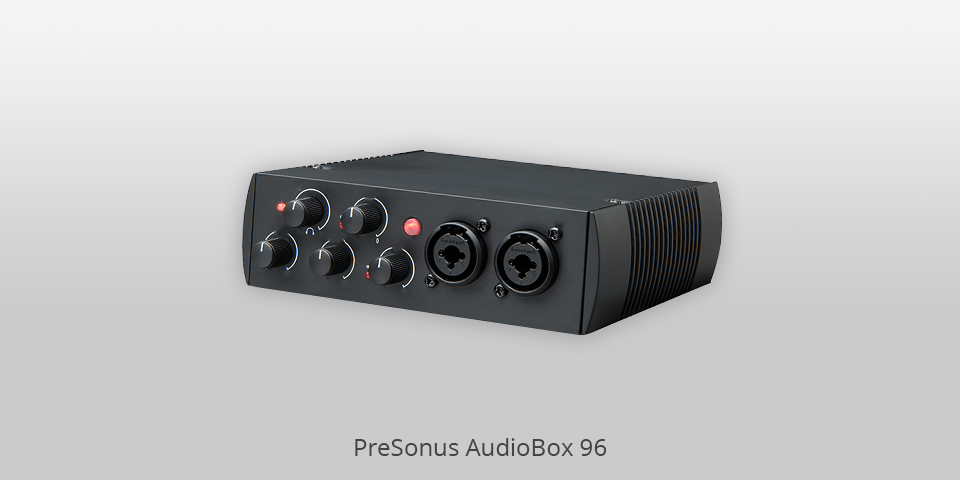
Connectivity: USB | Protocol: USB 2.0 | Resolution: 24-bit | Max Sample Rate: 96kHz | Number of Channels: 2
AudioBox 96 is an excellent Ableton audio interface that offers a smooth and pleasant audio recording experience. Seamlessly integrating with Ableton Live Lite, the unit allows you to start the music production process right away. I’ve benefited from low-latency monitoring when tracking vocals and guitars to ensure that nothing will distract you during the process.
I’ve used this audio interface for Sonar to record several tracks, and the clarity and depth of the output really impressed me. AudioBox 96 has been a handy assistant for me for layering synths, adding live instruments, or just experimenting with new ideas.
The MIDI I/O is another huge advantage for my setup, as it makes the integration of my MIDI keyboard and controllers with Ableton simple and smooth. The mixer control is another highlight of this unit. It also lets me create a custom zero-latency monitor mix fast and hassle-free.
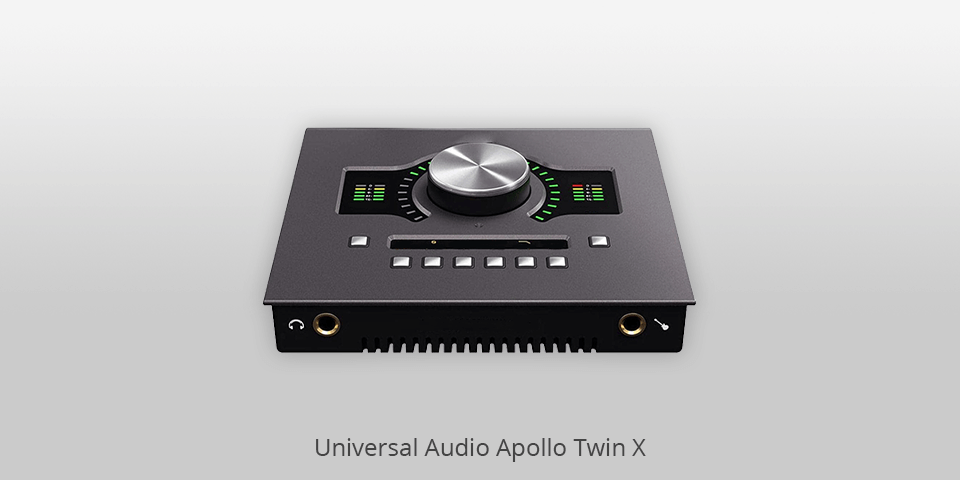
Connectivity: Thunderbolt 3 | Protocol: Thunderbolt 3 | Resolution: 24-bit | Max Sample Rate: 192kHz | Number of Channels: 8
By including Apollo Twin X into my Ableton workflow, I got absolutely new experience. The interface offers a low-latency performance and real-time UAD processing for recording top-level sound with first-rate plug-ins in an instant. Besides, this model is versatile and suitable for different setups thanks to many inputs and outputs, including ADAT for expansion.
Unison technology is another advantage of this audio interface for Logic Pro X. The device features two high-quality Unison microphone preamps that allow me to emulate the tone and character of many classic preamps and guitars and transform my vocal and instrument recordings completely.
Mac users will also appreciate Apollo Twin X integration with the LUNA recording system. This special edition comes with a top-level suite of premium plug-ins from Teletronix, Pultec, and Universal Audio, adding an amazing $1,300 value to the package.
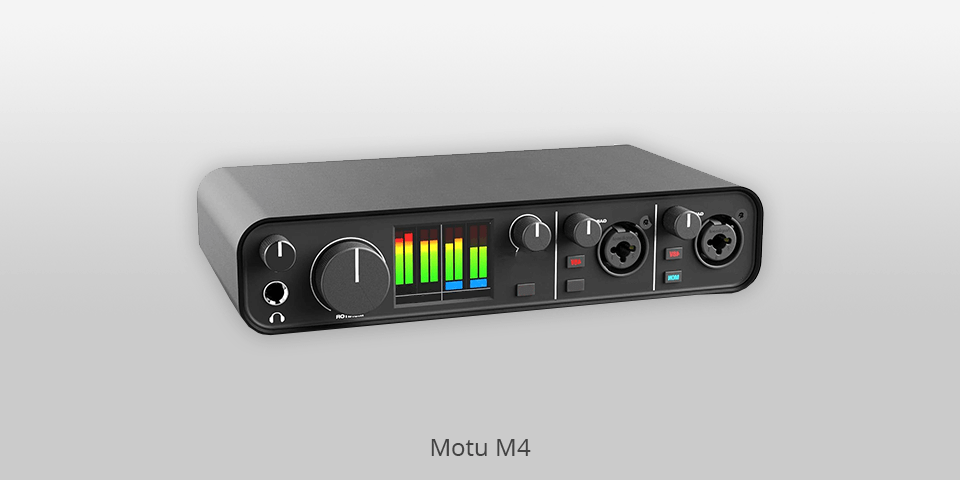
Connectivity: USB-C | Protocol: USB 2.0 | Resolution: 24-bit | Max Sample Rate: 192kHz | Number of Channels: 8
Motu M4 is probably the best audio interface for Ableton because of several reasons like low latency, detailed metering, premium build quality, as well as such handy features as loopback and direct monitoring. Once I plugged it in, I was surprised by its intuitive operation and immediate enhancement of the recording quality. Live tracking caused no problems as well, thanks to ultra-low latency and clocking in at just 2.5 ms.
The full-color LCD screen is what makes this model more appealing to me. Besides, thanks to detailed metering for all inputs and outputs, I could achieve the perfect levels in my mixes with ease. And when it comes to live streaming and podcasting, the built-in loopback feature is an absolute lifesaver. This option has been my handy assistant when sampling sounds directly from my laptop into Ableton.
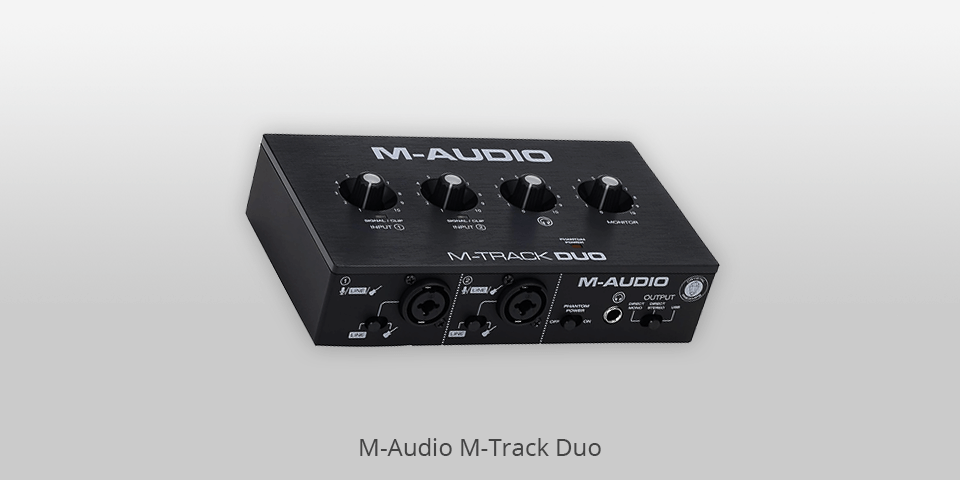
Connectivity: USB | Protocol: USB 2.0 | Resolution: 48-bit | Max Sample Rate: 192kHz | Number of Channels: 2
M-Audio M-Track Duo is a great audio interface for Ableton users, which is available at an affordable price. Delivering impressive sound quality, this model is not only reliable but also extremely easy to use. Besides, when offered at a discounted price, this is audio interface under $50.
When working in Ableton, low-latency tacking was an incredibly useful feature. With the USB/Direct switch, toggling between between direct input monitoring and playback was a no-brainer. This allowed me to stay in sync with my tracks without any interruptions.
The Crystal Preamps deliver crisp and clear audio, which is crucial when recording vocals with my condenser mic. Moreover, this is also a great audio interface for Audacity.
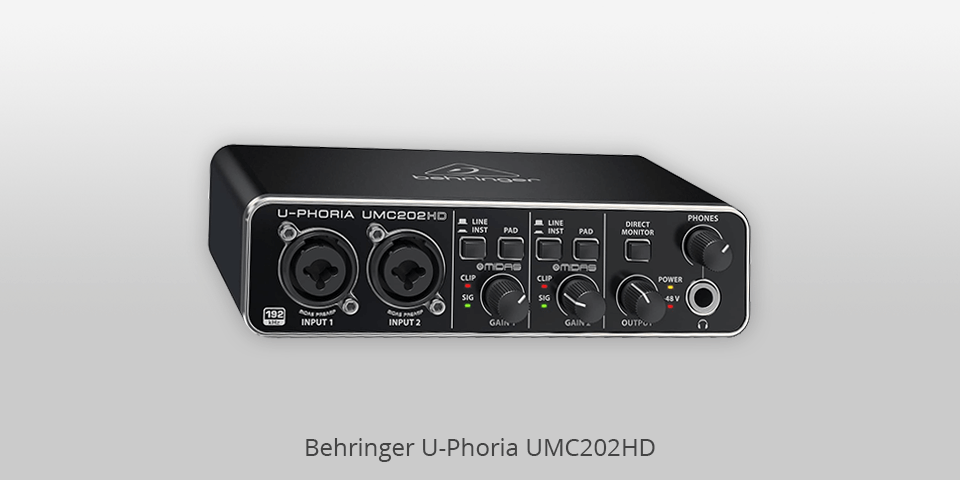
Connectivity: USB | Protocol: USB 2.0 | Resolution: 24-bit | Max Sample Rate: 192kHz | Number of Channels: 2
The Behringer U-Phoria UMC202HD stands out among other audio interfaces with its ability to integrate a wide variety of programs like Ableton Live, Avid Pro Tools, and Steinberg Cubase. Its seamless compatibility with Ableton allows me to plug in and start recording without experiencing any driver or setup issues.
Ultra-low latency during direct tracking is another highlight of this audio interface for Reaper. Direct Monitor switch allows monitoring of my performance in real-time without any delay.
Another huge plus of Behringer U-Phoria UMC202HD is its robust construction quality. The powerful phone output with its own level control comes in handy when I work at night and need to monitor in detail without disturbing others.
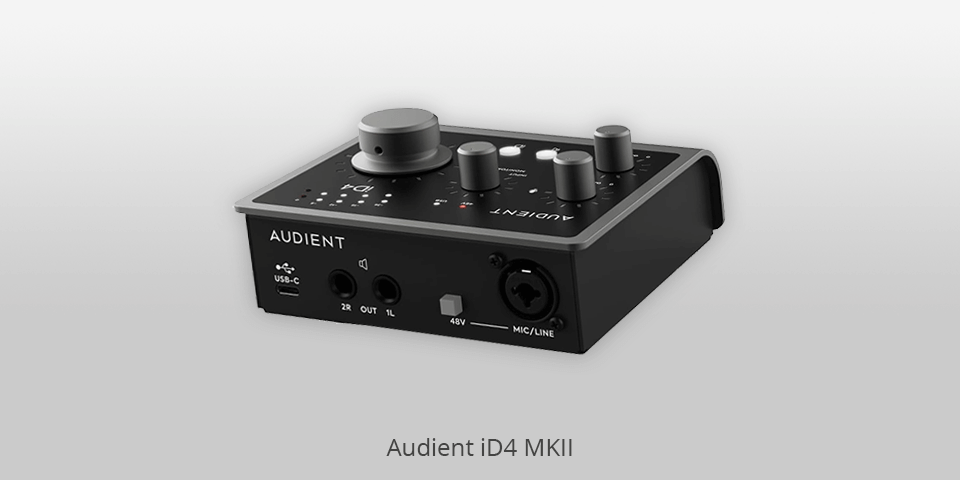
Connectivity: USB Type-C | Protocol: USB 3.0 | Resolution: 24-bit | Max Sample Rate: 192kHz | Number of Channels: 2
Audient iD4 MKII is a reliable and top-level audio interface for Ableton, which has many positive features. First, it features an excellent Class-A preamp that produces a crisp and warm sound, making vocals and instruments stand out in the mix.
The USB-C connectivity simplifies the setup and ensures reliable power, which is crucial when recording audio. This model also attracts excellent construction quality: its metal body is not only robust but also stylish. The headphone amplifier, which provides detailed sound, is definitely the highlight of this device.
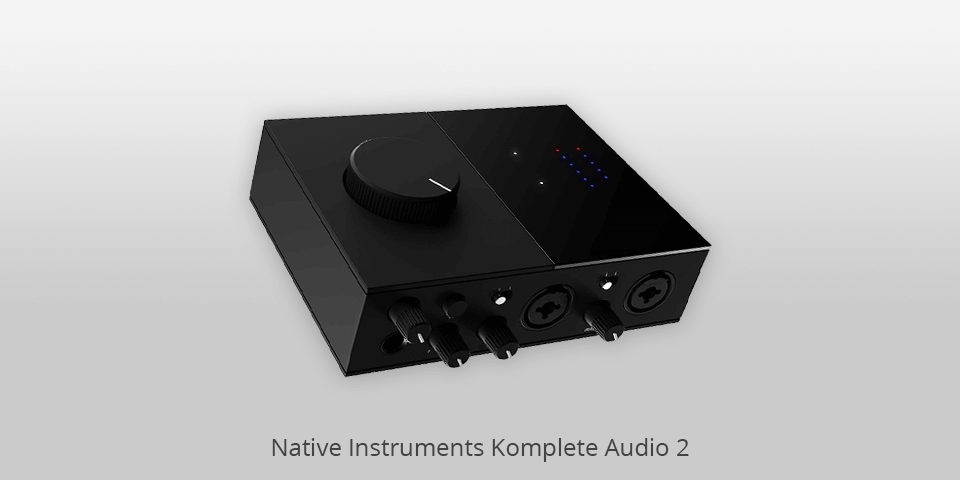
Connectivity: XLR | Protocol: USB 2.0 or higher | Resolution: 24-bit | Max Sample Rate: 192kHz | Number of Channels: 4
I chose Komplete Audio 2 because of its intuitive operation. This model is fitted with two combi-XLR/jack inputs allowing me to plug in a pair of mics for stereo recording or connect outboard gear like synths.
I also like its big volume knob on the top, which is smooth, accurate, and easy to adjust. It makes the audio interface for FL Studio even more convenient.
No matter what type of recording I need to create, I can be sure that the output will be clear and detailed. Komplete Audio 2 features dual jack outputs that provide enough power for my studio monitors, and I do not even need to turn the volume up past halfway in most cases. Low latency, which is only 2.5 ms on my Windows 10 setup using ASIO drivers, is another appealing feature.
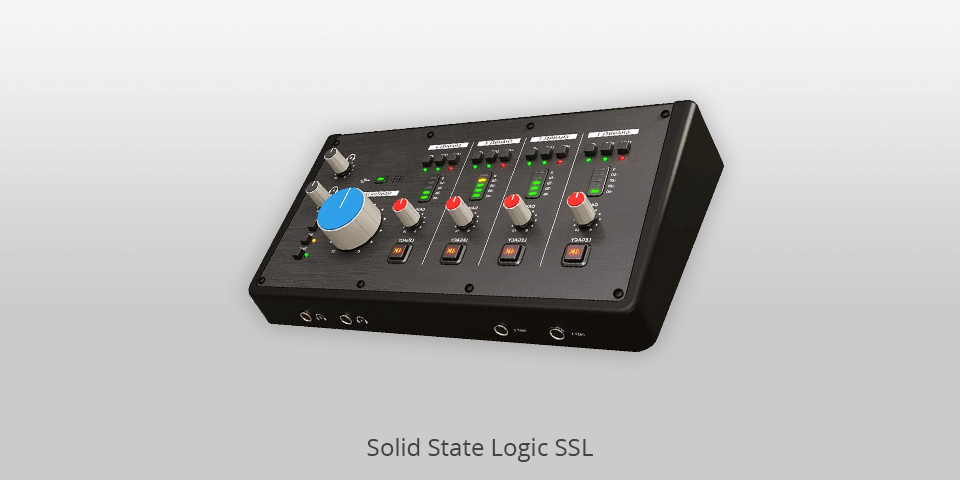
Connectivity: USB | Protocol: USB 3.0 or higher | Resolution: 32-bit | Max Sample Rate: 192kHz | Number of Channels: 12
Solid State Logic SSL delivers outstanding audio quality when I work in Ableton, which makes mixing and mastering a cinch and lets me achieve pro-level results. The device connects seamlessly to my Mac, and its USB-C connection is speedy and smooth.
The preamps are solid, clean and produce pristine audio to make my workflow in Ableton even more efficient. Zero-latency monitoring with built-in effects is another selling point of this audio interface. It has been incredibly useful during recording sessions.
Number of inputs and outputs. Before choosing the right model make sure that the device has the needed number of inputs and outputs. This is especially important for musicians who usually record multiple instruments or vocalists at once. For basic home studio setups, a 2-in/2-out interface might be enough.
Type of recording. Another aspect you should take into account is the type of recordings you are going to produce. Some devices are fitted with excellent preamps suitable for vocal recording, while others might better perform when capturing the sound of instruments.
Driver support. Make sure the selected integrace easily integrates with Ableton Live and your OS. Stable drivers and low latency are also important criteria to consider.
Connectivity. Take into account your computer’s ports and your preference for speed and reliability to choose the model with the needed connections like USB, Thunderbolt, or FireWire.
Preamps. It is only possible to get clean and accurate recordings when the audio interface is fitted with high-quality preamps.
Resolution and bit depth. To get the pro-level sound the interface should support at least 24-bit/96kHz resolution.
Durability. Robust build quality and portability are crucial for musicians who travel a lot. Rugged designs are more suitable for frequent transport.
MIDI Support. Users of MIDI controllers and instruments should make certain that the interface features MIDI input/output.
DSP Processing. Top-notch interfaces offer onboard DSP processing for low-latency monitoring and effects. This feature will come in handy if you want to enhance your recording with the effects.
Price range. Consider your budget. While premium interfaces have advanced features and amazing sound quality, many budget-friendly options offer great performance for home studios.
An audio interface is a device designed for connecting musical instruments, mics, and other audio channels to a PC. It works by turning analog signals into digital data supported by such DAWs as Ableton Live. With the help of an audio interface, you can achieve incredible quality of the recording, low latency, and reliable connectivity with your recording and mixing tools.
If you are looking for an affordable option, consider Focusrite Scarlett 2i2 (which stands out with its excellent preamps and reliability) or Focusrite Scarlett Solo 3rd Gen (which offers great performance at a moderate price).
Focusrite Scarlett 18i20 is fitted with high-end preamps, offers onboard DSP processing and top-level AD/DA conversion. Solid State Logic SSL is another model to consider. It delivers superior sound quality and has good preamps, making it a worthy model for complementing any serious home studio.
Conveniently, Ableton Live works seamlessly with audio interfaces with many inputs and outputs. This is essential when you need to record many instruments and mics at once or route audio to different outputs for more advanced monitoring setups.
Testing an audio interface with your setup is a reasonable decision. It is great that many music stores offer demo units for this purpose, and some online retailers have return policies for trying out the interface and making sure that it can satisfy your needs before making a purchase.